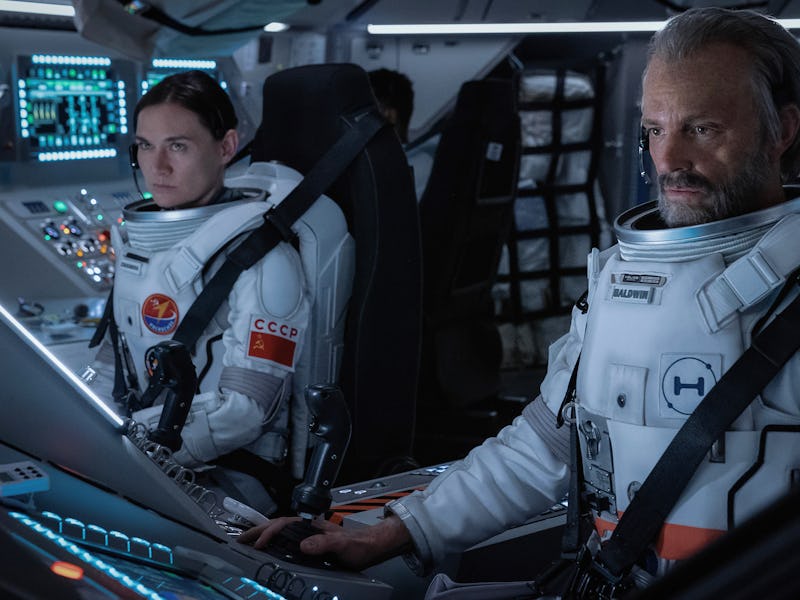For All Mankind Season 4 Reinvents 21st Century Sci-Fi — And Becomes Truly Original
Now set in an alternate 2003, For All Mankind isn’t relying on NASA nostalgia anymore.

Since 2019, one bold science-fiction series has stood apart. For All Mankind isn’t just one of the most intricate and measured sci-fi concepts ever created, it’s also a story that continues to defy expectations. In Season 1, the show asked the simple question: What if the USSR landed on the Moon before the United States? Now, with Season 4, the alternate timeline created by that one event leads to a new way of thinking about sci-fi in the 21st century. With Season 4, For All Mankind has started to catch up with the present day. This means the show has utterly ditched retro space nostalgia in favor of something truly original.
At New York City Comic-Con on Thursday, Oct. 12, 2023, Apple screened the first episode of For All Mankind Season 4, “Glasnost,” nearly a full month ahead of the actual season premiere on Nov. 10. It was one of the seven (out of the season’s 10) episodes that were made available to critics, but it gave a peek at the show’s bold transition from one kind of show to another.
The biggest change in Season 4 is that, at this point, there are a lot of new characters. If it’s been a second since you watched the Season 3 finale, now is a good time to remember that Molly is dead, Karen is dead, and Margo was presumed dead, but ended up getting secretly extradited to the USSR after being accused of espionage against NASA. All of these plot threads matter, but not in the way you might expect.
At the start of Season 4, we’re no longer in the ‘90s, but now in 2003. For a show that began in an alternate 1969, blasted ‘80s hits in Season 2, and rocked a ‘90s playlist in Season 3, it's brilliantly unsettling that a song by The Strokes now accompanies Mars spacescapes. (While Franz Ferdinand’s 2004 hit “Take Me Out” dominates the new trailer.) What began as a simple “what if?” historical question in Season 1 has butterfly-effected its way into one of the most believable sci-fi worlds ever depicted on TV. In many ways, the 2003 of For All Mankind looks like what our 2043 might look like (depending on what happens with NASA’s real-life Artemis missions). Like with Season 3, For All Mankind Season 4 creates a few off-screen fictional innovations to explain how technology continues to advance exponentially.
But just like in our own timeline, milestones in spaceflight are only partially predicated on technological advances. Setbacks and conflicts on Mars and elsewhere are 100 percent hampered by geopolitics, economics, and yes, the egos of specific people. For All Mankind Season 4 maintains its status as one of the best sci-fi shows ever because it's still very much about people, and how, in microcosm, those people represent all of humankind.
We’ve now followed Ed Baldwin (Joel Kinnaman), Danielle Poole (Krys Marshall), and Margo Madison (Wren Schmidt) for four decades, and that creates several unique emotional payoffs in Season 4. When we hear Dani and Ed greet each other by saying “Hi Bob,” it recalls the Season 1 episode of the same name, in which Dani, Ed, and Gordo (Michael Dorman) all tried to keep themselves from going bonkers on the Moon by reenacting a specific episode of The Bob Newhart Show. But the relationship between Ed and Dani isn’t just an Easter egg. They’ve said “Hi Bob” to each other in every season since, and now, they’re both much older people. Season 4 is filled with several small moments like this, which feel emotionally massive because the scope of the show is spanning so much of these characters' entire lives.
Krys Marshall as Danielle Poole in For All Mankind Season 4.
Few shows can actually pull this off. Because of its multigenerational approach, For All Mankind has been called a kind of alternate-history sci-fi version of A Hundred Years of Solitude. In earlier seasons, one could argue the bizzaro ‘70s and ‘80s were a kind of gimmick, a way to get retrofuturism mashed up with the nostalgia we all feel for the 20th century. But with Season 4, For All Mankind has basically emerged from its status as historical sci-fi. Being retro is no longer the primary aesthetic feature. Instead, the show is just starting to feel eerily real. This isn’t to say For All Mankind presents a better timeline than the one we live in. Sometimes the show feels like a prequel to a rosy Star Trek future. Other times, it's like they’re setting up The Expanse. The profundity of watching the show is thinking about how the choices the people make are always shaping the future, one way or another.
For All Mankind has a seven-season outline. At this point, they’re a little over halfway. But if the show does make it to that point — and ends sometime close to alternate 2030s — the science-fiction world that will exist by that time will be like nothing else ever in the genre. And the best part is, with every single episode, we have no idea what will happen next.
For All Mankind Season 4 hits Apple TV+ on November 10, 2023.
This article was originally published on